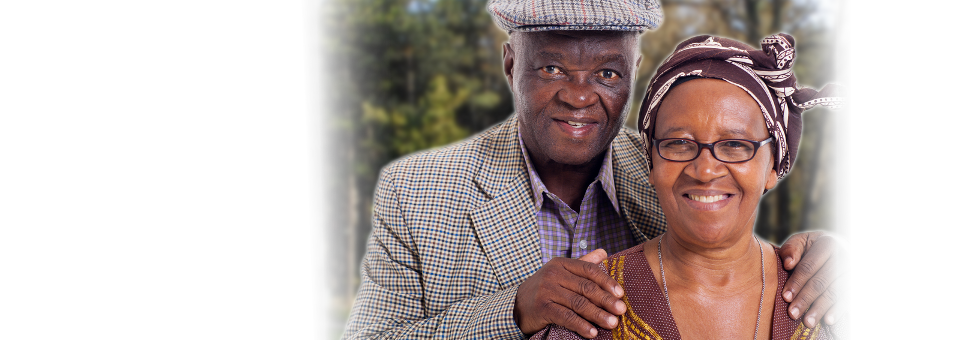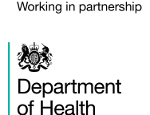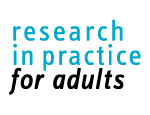Download the whole case study as a PDF file
Michelle and Joel
Michelle and Joel live in a city. They have been married for 45 years and have two sons, Clinton in Scotland and Daniel, who is 34 and lives with them. Daniel has a learning disability. Michelle gave up work when Daniel was 16 to support him. Joel retired three years ago. Over the years they have sought support through the council but it has never worked very well.
When you have looked at the materials for the case study and considered these topics, you can use the critical reflection tool and the action planning tool to consider your own practice.
Name:
Name: Michelle Tyndell Joel Tyndell
Gender: Female Male
Age: 65, 68
Ethnicity: Black British
Download resource as a PDF file
First language: English
Religion: Christian
Michelle and Joel live in a city. They have been married for 45 years and have two sons, Clinton in Scotland and Daniel, who is 34 and lives with them. Daniel has a learning disability. Michelle gave up work when Daniel was 16 to support him. Joel retired three years ago. Over the years they have sought support through the council but it has never worked very well.
Daniel volunteers at a local charity a few days a week, helping with teas and coffees. He would like to live independently. Joel and Michelle are worried this won’t work. Daniel is well known in the local community. He is also known to the police due to a few incidents where he has been violent. Daniel is often misunderstood as it is not immediately clear that he has a learning disability, and people who don’t know him can react to his behaviour. Daniel has some friends from volunteering and some other friends from the local area.
Joel and Michelle support Daniel to ensure he is washed and dressed appropriately, has had his medication and knows where he needs to be. Sometimes Daniel refuses his medication. Daniel has a mobile phone which he is able to make and receive calls on. Sometimes Michelle drives Daniel and sometimes they take him to the bus. Daniel has his own money but it is not clear what he is spending it on. Michelle and Joel are concerned that Daniel may be giving money to his friends.
Joel and Michelle love their son, however they are exhausted and feel undervalued by providing his care. They have had to make choices to put Daniel first, have few friends and rely on each other. Joel had a heart attack last year and they are fearful about what will happen with Daniel in the future. Before children, Michelle and Joel were keen music fans.
Michelle and Joel recently rang the council and asked for someone to talk to them about their situation. You have been out to visit them and met Daniel briefly. You have completed the assessment and the support plan. Daniel has agreed to an assessment which will happen soon.
Download resource as a PDF file
Name: Michelle Tyndell Joel Tyndell
Gender: Female Male
Age: 65 68
Ethnicity: Black British Black British
First language: English English
Religion: Christian Christian
Date chronology completed 6 March 2016
Date shared with person 6 March 2016
| Date | Life Event | Outcome and/or response |
| 1.09.47 | Joel Tyndall born in Portmore, Kingston, Jamaica. | Joel had a big family and is still in touch with one of his sisters regularly, his parents died in the 80s. |
| 3.12.50 | Michelle Barton born in Portmore, Kingston, Jamaica. | Michelle’s parents died when she was young and has lost touch with her siblings when she moved to England. |
| 18.9.70 | Joel and Michelle married. | |
| 24.5.72 | Joel and Michelle moved to England and lived with Joel’s cousin. | Joel got a job as a builder – he got on well and was supervising other builders after a few years.
Michelle worked as a cleaner. |
| 17.7.10% | Clinton born. | Michelle had had two late miscarriages before this but they weren’t given much advice or help about this.
They were very glad when Clinton was born safely. |
| September 10% | Moved into own flat. | This was positive for them as they could have their own space. |
| 29.7.81 | Daniel born. | Joel and Michelle said they weren’t sure they could have another child.
They said that it was a difficult birth but the hospital was more interested in the royal wedding. |
| Summer 1983 | Daniel seen by GP and had some tests because he wasn’t walking. | GP told Michelle and Joel that Daniel had ‘development delay’ but they didn’t really understand why. |
| March 1984 | Daniel is diagnosed with epilepsy. | At first doctors didn’t realise this is what was happening. Daniel was eventually diagnosed and has been taking medication since. He has never really liked taking the medication. |
| September 86 | Daniel started school. | His parents report that Daniel never got on well with school.
Michelle went back to doing some part-time work as a cleaner. |
| Parents are not sure of dates | Various people see Daniel about his speech, behaviour, epilepsy. | Daniel had a few major fits and his medication was updated.
He had some speech and language therapy and his parents said that helped a bit. Daniel got into trouble at school quite often for fighting and had to see a counsellor but his parents said that it didn’t seem to make any difference. |
| June 1994 | Daniel leaves school and Michelle stops work. | Parents report that they were managing ok. |
| July 1998 | Clinton gets married and leaves home. | He moves to Scotland and visits a couple of times a year. |
| May 1999 | Daniel gets in a fight in town and the police bring him home. | The police refer Daniel to social services. |
| June 1999 | Social work assessment. | Social worker suggests that Daniel has some more activities so he starts to go to Mencap one day a week – he quite likes this. |
| October 2002 | Daniel shouts at someone at Mencap centre and social worker visits for a reassessment. | Social worker works with Daniel and the centre to resolve the incident and support Daniel better through activities that he likes.
Social worker arranges respite for Daniel. Joel and Michelle report that it doesn’t work well because Daniel is unhappy and the respite home kept calling Michelle. |
| March 2008 | Daniel hits someone in town and the social worker visits for a reassessment. | Daniel said it was because the person called him names.
The police give him a caution. Social worker arranges a ‘direct payment’ for a personal assistant to do activities with Daniel. |
| January 2010 | Michelle and Joel ask for a review. | Direct payment cancelled because it is difficult to manage and Daniel says he doesn’t need it. |
| April 2012 | Day centre closes. | Mencap arrange for Daniel to have a volunteer role at another centre supporting other people with refreshments twice a week.
Daniel’s case is closed in social services as he is not receiving any statutory services. |
| August 2013 | Joel retires. | Joel helps out a bit more at home now. |
| September 2014 | Joel has a heart attack | Joel is in hospital for a few days and starts medication. |
| 28.1.16 | Michelle and Joel ring social services and ask for someone to talk to. | Referral is allocated to the social worker in the learning disabilities community team. |
| 4.3.16 | Social worker visits. | Assessment with Michelle and Joel, then discussion with Daniel. Daniel agrees to have a reassessment in the next month. |
| 6.3.16 | Paperwork completed. | Sent to Joel and Michelle. |
Michelle Tyndell
Download resource as a PDF file
What others like and admire about me
I care for my family
I have a great sense of humour
I am determined
I moved to England and I made a life for myself and my family
I brought up my boys to be good people
What is important to me
My children
My husband – I want him to be with me for a long time
To know that Daniel will be looked after when we are gone
Daniel and Clinton not getting into any trouble
How best to support me
Someone to know about us
To know who will look after Daniel when we are gone
To have help that works, not that makes things more difficult
Make sure Joel is well
Make sure Daniel doesn’t get into fights
Let me know if I am doing things right
Joel Tyndell
Download resource as a PDF file
What others like and admire about me
I provide for my family
I was a good worker and I worked hard
People in the neighbourhood respect us
I moved to England and I made a life for myself and my family
I brought up my boys to be good people
What is important to me
My sons – I want them to do well in life
My wife should have some help
I want Daniel to be looked after when we are gone
I don’t want Daniel to get into trouble with the Police
Talking to my friends about the world
How best to support me
To know what will happen to Daniel when we are gone
To have some help for Michelle that gives her a rest
Make sure Daniel doesn’t get into trouble
Don’t tell us what to do, suggest things
Let me know what you can do, I don’t know what help there is
Provide advice on support for parents in this situation
Download resource as a PDF file
Michelle and Joel’s Ecogram
Name: Michelle and Joel
Date completed: 6 March 2016
Download resource as a PDF file
Carers Assessment
About me
Name: Michelle Tyndell Joel Tyndell
Address 1 Railway Terrace, Hamton, City ZZ1 Z11
Telephone 012345 123456
Gender: Female Male
Date of birth 3.12.50 1.09.47
Age: 65 68
Ethnicity: Black British Black British
First language: English English
Religion: Christian Christian
GP Dr Fish, Station Surgery
How would you like us to contact you?
Phone
Do you need any support with communication?
No
About the person/ people I care for
My relationship to this person Mother and father
Name Daniel Tyndall
Address 1 Railway Terrace, Hamton, City ZZ1 Z11
Telephone 012345 234567
Email Daniel4126@yay.com
Gender Male
Date of birth 29.7.81 Age 34
Ethnicity Black British
First language English
Religion None
GP Dr Cox, Station Surgery
Please tell us about any existing support the person you care for already has in place. This could be home care, visits or support from a community, district or community psychiatric nurse, attending any community groups or day centres, attending any training or adult learning courses, or support from friends and neighbours.
Daniel goes to Mencap twice a week as a volunteer at a centre a short bus ride or drive away – he helps out with the refreshments and also he takes part in activities. Daniel likes photography and computer games, but he doesn’t like making things.
The GP surgery arranged an epilepsy nurse to see Daniel sometimes. They send his prescription to the pharmacy for us to collect.
Daniel has two friends he has met through volunteering – Chris and Joline (Jo). They go out sometimes to the cinema or to the pub.
Daniel also has some friends in town that we don’t know that well. He met them when he was in his early 20s and he still sees them. They tend to hang round in town and we think he goes out to meet them. We are concerned that they are taking or borrowing money from him. ‘They are a bad influence and will get him into trouble’ (Joel).
Daniel gets Personal Independence Payment and also Employment and Support Allowance but this has just changed and we don’t really understand it.
Daniel used to go to day centre before it closed and he started volunteering. We had a direct payment for a while but it was very complicated. We couldn’t find personal assistants so we used the agency but then there were lots of different people and we all (Daniel too) agreed it was better not to have the direct payment.
Daniel recently said that he would like to live independently.
The things I do as a carer to give support
Please use the space below to tell us about the things you do as a carer (including the emotional and practical support you provide such as personal care, preparing meals, supporting the person you care for to stay safe, motivating and re-assuring them, dealing with their medication and / or their finances).
Daniel has a learning disability but nobody has ever been able to tell us what exactly it is. He also has epilepsy and has to take medication for that. Daniel seems fine when you meet him. He struggles to follow conversations and he doesn’t remember instructions unless you write them down. He can read big print and simple words but he can’t manage official letters. Daniel doesn’t ‘do dates and times’ so you need to remind him about things. We have a calendar and a list for him, and we have a list for what he needs to take when he goes out (phone, money, keys). Daniel can be a bit clumsy and we try to keep the house tidy and make sure there isn’t anything breakable. He doesn’t like fiddly tasks because he gets annoyed that he can’t do them well. Daniel looks after himself mostly’ (Michelle)
Daniel doesn’t have seizures often and he usually knows if he is starting to get one. This tends to happen when he is stressed or overexcited. We make sure that there aren’t things that he can hurt himself with if he has a seizure. The epilepsy nurse advised us about this. We don’t leave the house when Daniel is having a shower.
Sometimes Daniel gets frustrated and then it is best to just tell him it’s ok and leave him alone. When you push things he shouts and he has hit people in the past but he has never hurt us.
Daniel can be taken advantage of because he doesn’t remember if he has paid for things and he will try to help you if you ask. Also he can’t tell money apart easily so he might give you the wrong note or coin. Daniel thinks the best of people and likes to do things for them. We think some of the people that he thinks are his friends might ask him for money.
Daniel spends a lot of time in his room playing on his phone.
We remind Daniel to have a shower and brush his teeth each morning. We make sure he has clean clothes on.
Michelle does the washing and cleaning in the house and cooks all the meals.
Joel collects Daniel’s medication and makes sure he takes it every day – sometimes he doesn’t want to and then Joel has to persuade him.
Joel checks Daniel’s bag and pockets before he goes out to make sure he has what he needs for the day.
We call Daniel if he isn’t back for lunch or tea.
Joel helped Daniel get his benefits and set up a bank account, and helps him look at the statements and any other letters.
Michelle puts appointments in the calendar and drives Daniel to them and goes with him. She drives him to the centre or we walk him to the bus stop.
How my caring role impacts on my life
Please use the space below to tell us about the impact your caring role has on your life.
It was difficult for us to have children and we thank God for them.
When Daniel was little we didn’t understand why he was different and we didn’t get any help until he was at school. We were told by a doctor that he had ‘development delay’ but we never understood why. Daniel always needed more help than Clinton and didn’t do well at school. We got some advice particularly from the speech and language therapist and also from the epilepsy nurse, but we mostly got on with it ourselves.
When Daniel was 16, he left school and Michelle gave up work. Daniel got into trouble with the Police after a fight. We got some support from social services for him to go to Mencap and they have helped with him going there and then being a volunteer.
The main impact is the worry. We have been worried about Daniel getting into trouble with fighting. We are worried about his friends and we wonder if we should check his phone and his social media to see who he is in contact with. Daniel has his own money but sometimes it disappears really quickly and he doesn’t have anything to show for it – we worry that he is being taken advantage of.
Also it is quite stressful if we are asking Daniel to do something like take medication or have a shower and he doesn’t want to.
‘We are exhausted’. We have had to put Daniel first, and we have given up a lot – all our friends except for a few, and going out in the evenings. We really only have each other. We don’t feel appreciated sometimes and that makes us feel guilty.
Joel had a heart attack last year and we are both fearful about what will happen with Daniel in the future. Daniel recently said he wants to live on his own but we don’t see how that will work. We don’t see how someone else would be able to look after him as we have.
What supports me as a carer?
Please use the space below to tell us about what helps you in your caring role.
Chris and Jo at the Mencap centre help Daniel and go out with him sometimes in the evening.
The epilepsy nurse gave us lots of advice.
The GP helps Joel with his medication and makes sure the pharmacy gets his prescription.
Jim and Sue who are friends from when we arrived in England see us a few times a year and that is lovely. Our son Clinton visits a few times a year.
My feelings and choices about caring
Please use the space below to tell us about how you are feeling and if you would like to change anything about your caring role and your life.
We don’t mind helping Daniel, he is our son and we love him and we want to look after him.
We want Daniel to be ok and not to get into trouble. We need to know what will happen when we can’t look after Daniel.
We want to not have to worry so much.
We need to stay healthy as long as we can to look after him.
It would be nice to see friends more and have someone to talk to other than just us. And to know that we are doing the right thing.
Information, advice and support
Let us know what advice or information you feel would help you and what sort of support you think would be beneficial to you in your caring role.
We don’t really know what is out there so we need someone to advise us but it has to work for us. Some of the help in the past didn’t work for us.
Maybe it would help to have:
Some more time for us
Advice about how to keep Daniel out of trouble
Some help with knowing what to do if Daniel doesn’t want to take his medication
Advice about benefits
A plan in place for the future
It would be good for Daniel to have some advice and support from people who know what it is like to have a learning disability and epilepsy. We understand that he wants to be more independent but he does need to know how to be safe.
Conclusion
To be used by social care assessors to consider and record measures which can be taken to assist the carer with their caring role to reduce the significant impact of any needs. This should include networks of support, community services and the persons own strengths. To be eligible the carer must have significant difficulty achieving 1 or more outcomes without support; it is the assessors’ professional judgement that unless this need is met there will be a significant impact on the carer’s wellbeing. Social care funding will only be made available to meet eligible outcomes that cannot be met in any other way, i.e. social care funding is only available to meet unmet eligible needs
Date assessment completed 6 March 2016
Social care assessor conclusion
Michelle and Joel have provided support to Daniel since he was born as carers as well as parents. They provide daily support to Daniel. The only other support is from Mencap where Daniel volunteers and from community health services. Joel, Michelle and Daniel have a few family friends.
Joel and Michelle love their son greatly and want to continue to support him. They identify that there is a risk of them becoming unwell and Daniel getting into trouble without further support. In particular, Joel had a heart attack last year and Daniel may be at risk from his friends. Joel and Michelle are experiencing stress and it is important to support them now to avoid potential breakdown of the situation through ill-health or inability to support Daniel as he needs.
Daniel has told his parents that he wants to live independently. This causes them concern and they are worried about what will happen when they are gone. This area needs to be explored more with Daniel in his own assessment, and then with him and his parents together. There needs to be a plan in place for the future.
As part of this assessment we talked about Joel and Michelle getting in touch with their friends and building support through the carers’ centre. Advice, support and planning would help to promote Michelle and Joel’s wellbeing and help them to continue as carers which is what they want.
Eligibility decision Eligible for support
What’s happening next Create support plan for Joel and Michelle
Carry out assessment for Daniel
Completed by
Name
Role
Organisation
Signing this form (for carer)
Please ensure you read the statement below in bold, then sign and date the form.
I understand that completing this form will lead to a computer record being made which will be treated confidentially. The council will hold this information for the purpose of providing information, advice and support to meet my needs. To be able to do this the information may be shared with relevant NHS Agencies and providers of carers’ services. This will also help reduce the number of times I am asked for the same information.
If I have given details about someone else, I will make sure that they know about this.
I understand that the information I provide on this form will only be shared as allowed by the Data Protection Act.
Name
Signature
Name:
Name
Signature
Download resource as a PDF file
About me
Name: Michelle Tyndell Joel Tyndell
Address 1 Railway Terrace, Hamton, City ZZ1 Z11
Telephone 012345 123456
Gender: Female Male
Date of birth 3.12.50 1.09.47
Age: 65 68
Ethnicity: Black British Black British
First language: English English
Religion: Christian Christian
GP Dr Fish, Station Surgery
About the person/ people I care for
My relationship to this person Mother and father
Name Daniel Tyndall
Address 1 Railway Terrace, Hamton, City ZZ1 Z11
Telephone 012345 234567
Email Daniel4126@yay.com
Gender Male
Date of birth 29.7.81 Age 34
Ethnicity Black British
First language English
Religion None
GP Dr Cox, Station Surgery
Support plan completed by
Name
Role
Organisation
| Needs | Outcomes | Actions |
| To be able to keep supporting Daniel | We stay well
We know we are doing the right thing Daniel understands the need to take his medication and makes choices about this |
Michelle to let GP know that they are carers and to ask for a health check.
Arrange for carers’ centre to have a carer meet with Michelle and Joel and talk to them about how they are doing and share information about local carers’ support. Arrange for the epilepsy nurse to meet with Michelle and Joel about Daniel’s medication – and then look at this as part of his assessment. |
| To be less isolated | We can go out sometimes in the evenings
Joel has time to see his work colleagues We are able to see our friends Jim and Sue every few months |
Provide a one off direct payment for a Tablet and three sessions to support use of it so that Michelle and Joel can: arrange on-line shopping, set up Skype to Jamaica and to their friends, access information about the things they are interested in.
Michelle and Joel to get in touch with Jim and Sue and with work colleagues and arrange for them to visit. Joel and Michelle will make contact with the local African-Caribbean Community Centre which has regular evening socials. As part of Daniel’s assessment, look at options for Daniel to socialise in the evenings. |
| Not to be worried about Daniel | Daniel has enough money
Daniel has something to do that he likes Daniel has friends |
This is very important to Joel and Michelle’s wellbeing – we will need to look at this as part of Daniel’s assessment as these are to do with his life and his choices.
Michelle and Joel will share information with Daniel about the ‘safe place scheme’ so he knows which places will help him if he needs to ask for help. |
| To know Daniel will be ok when we are gone | To have our affairs in order for him.
A plan for Daniel that we are all happy with |
Joel and Michelle will go to Citizens Advice Bureau to talk to them about benefits and making a will.
With Daniel’s agreement, after his assessment have a meeting with him and Michelle, Joel and Clinton to talk about future plans. Michelle and Joel to prepare by keeping a diary of what they do each day for the next month. Michelle and Joel will meet up with someone from the carers’ centre to talk about planning for the future. |
Date of support plan: 6 March 2016
This plan will be reviewed on: 6 July 2017
Joel and Michelle are happy for their assessment and support plan to be considered as part of Daniel’s assessment, however they do not want them to be shared with Daniel.
Signing this form
Please ensure you read the statement below in bold, then sign and date the form.
I understand that completing this form will lead to a computer record being made which will be treated confidentially. The council will hold this information for the purpose of providing information, advice and support to meet my needs. To be able to do this the information may be shared with relevant NHS Agencies and providers of carers’ services. This will also help reduce the number of times I am asked for the same information.
If I have given details about someone else, I will make sure that they know about this.
I understand that the information I provide on this form will only be shared as allowed by the Data Protection Act.
Name
Signature
Name:
Learning disability
Research highlights that community learning disability teams are effective when they put the individual and their surrounding family or carers at the heart of a service (National LD Professional Senate 2015). The manual on social work with people with autism (DH 2015) highlights issues of carer identity, carers networks, parental/care identity, stigma, recognition and validation plus advice around self-help and having a life.
- Department of Health (2015) A manual for good social work practice: Supporting adults who have autism, The College of Social Work
- Challenging Behaviour Foundation (2016) Stopping Over-Medication of People with a Learning Disability, Autism or Both (STOMP): a family carer perspective
- SCIE (2011) Improving access to social care for adults with autism
- SCIE (2011) At a glance 21: Personalisation briefing: Implications for people with autistic spectrum conditions and their family carers
- NICE quality standard on Autism
Video
- Justice for LB, The Tale of Laughing Boy
Tool
Attachment
Recent interest has centred on attachment theory – a stalwart in child and family social work (Shemmings 2016) – having application to relationship based social work with adults and their carers (RiPfA 2015, Bennett 2011), and promoting positive change (Baim and Morrison 2011) across the life course (Howe 2011). A good practice project (DH 2013) with people with learning disability included a case study with an organisational model based on Attachment, Object Relations, Developmental, Systemic and Trauma theories – essentially a psychotherapy based service rather than social work but with transferable practice lessons.
- The College of Social Work (2011) The Business Case for Social Work with Adults: A Discussion Paper
- Baim and Morrison (2011) Attachment-based practice with adults
- Carers Trust (2015) Dads care too: A survey of the experiences of fathers who are carers
Tool
Practice example
Risk enablement and independence
The literature review uncovered an interesting document that concerned people with learning disabilities and challenging behaviour going into hospital (NHS England 2014). Written for family carers, it offered the description of the social worker’s role as to: assess your loved one’s whole situation and what life was like before their admission – their history, their relationships, their home life, their occupation, their wishes. Called Getting It Right, it said all people with learning disabilities will have a named worker (social worker or nurse) and that the social worker may be the responsible clinician. Within these processes direct payments has attracted attention with suggestions of social worker reluctance and lack of imagination. There are, in theory, few restrictions to the use of payments to support carer’s or to curtail innovation (Dittrich 2013).
- RiPfA Frontline: Risk enablement (Chart)
- SCIE (2011) At a glance 37: Challenging behaviour: a guide for family carers on getting the right support for adults
- SCIE (2011) At a glance 39: Challenging behaviour: a guide for family carers on getting the right support for teenagers
- SCIE (2011) At a glance 38: Challenging behaviour: a guide for family carers on getting the right support for children
- SCIE (2010) SCIE Report 36: Enabling risk, ensuring safety: Self-directed support and personal budgets
- NICE quality standards on Learning disabilities and challenging behaviour
- NIHR (2014) Risk, Safeguarding and Personal Budgets: exploring relationships and identifying good practice
Video
- SCIE Challenging behaviour and learning disabilities: independent living (video)
- SCIE (2014) Care Act: a strengths-based approach
Tools
- Tool 3: Risk enablement chart – RiPfA (2015) Frontline chart: Risk enablement
- Tool 4: Risk Principles (RiPfA Good decision making handbook)
Older family carers
Research flags life change awareness as an important element of work with people with learning disabilities (RCGP/RCP 2012). Understanding transition theory remains an essential in using life course development knowledge in social work practice with adults (Crawford and Walker 2010).
- SCIE (2015) Adult carer transition in practice under the Care Act 2014
- Carers UK and Age UK (2015) Caring into later life
- Carers Trust (2015) Caring About Older Carers Providing Support for People Caring Later in Life
- Princess Royal Trust for Carers (2011) Always On Call, Always Concerned A Survey of the Experiences of Older Carers
- Mencap (2013) Short breaks support is failing family carers: reviewing progress 10 years on from Mencap’s first Breaking Point report
- UCL (2015) The emotional wellbeing of older carers
- Fitzroy (2015) Who will care after I’m gone? An insight into the pressures facing parents of people with learning disabilities
Video
- SCIE (2010) Supporting carers: the social worker
- SCIE Action for Carers, Surrey video – respite service co-production
- SCIE Innovation: Living together
Tools
- Tool 5: Planning for people with learning disabilities – Foundation for people with learning disabilities (2010) Supporting you and your family as you grow older together A booklet for people with learning disabilities who live at home with an older family carer
- Tool 6: Planning for older family carers – Foundation for people with learning disabilities (2010) Supporting you as an older family carer A booklet to support older family carers of people with learning disabilities to get the right support now and to plan for emergencies and the long term
Ethnicity and culture and language
Common factors identified in the research for social work practitioners working with adults and their carers included information, advice and guidance – having the specialist knowledge or knowing where to signpost people – assessment and the processes of carer-directed self-support, and using knowledge and skills to work with the whole network of relevant people.
- Carers UK (2012) Half a Million Voices: improving support for BAME carers
- Foundation for people with learning disabilities (2012) Reaching out to people with learning disabilities and their families from black and minority ethnic communities
- Race Equality Foundation (2010) Improving health and social care support for carers from black and minority ethnic communities
- SCIE (2010) SCIE Report 31: Good practice in social care for refugees and asylum seekers
- Care Council for Wales (2010) Different words, different worlds?: the concept of language choice in social work and social care
- Race Equality Foundation (2018) Dementia and Minority Ethnic Carers
Tool
- Tool 7: Culturally Competent Planning – Foundation for people with learning disabilities (2012) Guidance for Families of People with Learning Disabilities and Practitioners in Developing Culturally Competent Planning
Download the tool as a PDF file
Tool 1: Involving parents of people with a learning disability
This tool sets out a parent’s view of their sons growing up. You can use it to reflect on how you respect the thoughts and feelings of parents who care for their children as they grow up and grow older.
‘Respect the thoughts and feelings of me as a parent, I really want my sons to move on and have a great life as independent as possible, but I have spent all their life so far caring for them and protecting them and that next step is a huge step!
Remember in your eyes and the law according to the Care Act 2014 and the Children and Families Act 2014 when my son reached 18 he was an adult, but nothing has changed on a day to day basis, he still wakes me up at 5am demanding to know what the day will bring!
Plan with us as a family ensure we are part of all the conversations, we are pretty resilient – we will have good ideas of our own.’
Please think outside the box and help us find activities and experiences for our sons that to other young people without additional support needs are pretty ordinary. Our sons should be able to access all activities that other young people do, they just may need a little support to enable this to happen, this is where we need your help.
It’s not rocket science! – we want for our sons what everyone else would want for their sons and daughters we want them to be happy and to lead a fulfilled life – we don’t want extraordinary we just want ordinary!’
How will I work with people with learning disabilities alongside their parents to enable them to ‘have a great life?’
You can use this tool to consider a transition point in someone’s life.
![]() Download the tool as a PDF file (430KB)
Download the tool as a PDF file (430KB)
Download the tool as a PDF file
Tool 2: Social Work capabilities for attachment-aware practice
This tool sets out the social work capabilities in the Professional Capabilities Framework that relate to attachment-aware practice. You can use this to consider your own practice and learning needs.
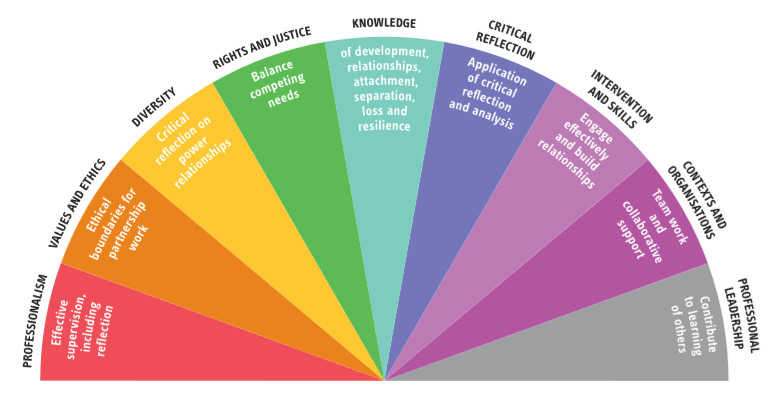 Click on the diagram to open full size in a new window
Click on the diagram to open full size in a new window
What are my strengths in relationship-based working?
Where do I need to develop my practice?
How will I do this?
What support do I need?
This tool is taken from RiPFA’s Adult attachment – Implications for adult social care practice: Frontline Briefing (2015)
This tool sets out the stages of a mediation process. You can use it to plan and deliver a mediation session.
![]() Download the Risk enablement tool as a PDF file (495KB)
Download the Risk enablement tool as a PDF file (495KB)
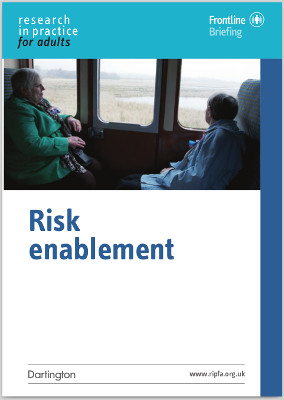 Tool 3: Risk enablement
Tool 3: Risk enablement
Risk enablement is a key skill for practitioners in promoting wellbeing and achieving outcomes.
As an approach, risk enablement identifies a link between risk and enablement. Risk enablement recognises that taking carefully considered risks can enable individuals and help improve their wellbeing.
Positive risk-taking is a way of working with risk that promotes enablement. It is important to remember that the ‘positive’ in positive risk-taking
refers to the outcome not the risk.
![]() Download the Risk enablement tool as a PDF file (471KB)
Download the Risk enablement tool as a PDF file (471KB)
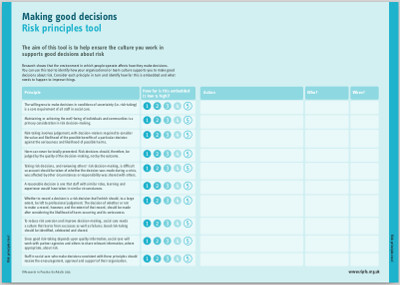 Too 4: Risk Principles
Too 4: Risk Principles
The aim of this tool is to help ensure the culture you work in
supports good decisions about risk.
Research shows that the environment in which people operate affects how they make decisions.
You can use this tool to identify how your organisational or team culture supports you to make good decisions about risk. Consider each principle in turn and identify how far this is embedded and what needs to happen to improve things.
![]() Download the Risk Principles tool as a PDF file (49KB)
Download the Risk Principles tool as a PDF file (49KB)
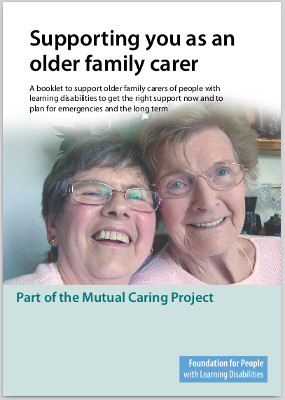 Tool 5: Supporting you as and older family carer
Tool 5: Supporting you as and older family carer
Foundation for People with Learning Disabilities
A booklet to support older family carers of people with learning disabilities to get the right support now and to plan for emergencies and the long term
![]() Download the Planning for older family carers tool as a PDF file (1.2MB)
Download the Planning for older family carers tool as a PDF file (1.2MB)
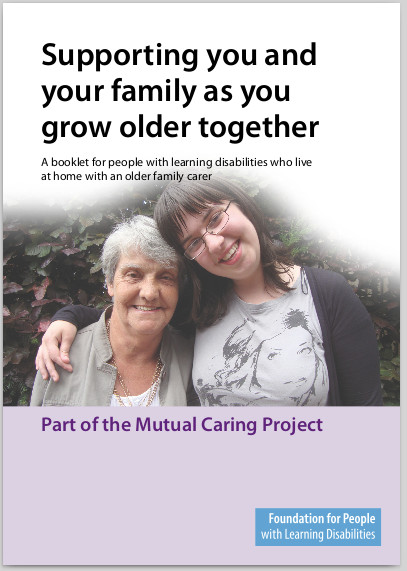 Tool 6: Planning for people with learning disabilities
Tool 6: Planning for people with learning disabilities
Supporting you and your family as you grow older together
A booklet for people with learning disabilities who live at home with an older family carer.
This booklet tells you more about:
- Good questions to ask
- Things that can help you now and in the future
- Some of the people who can help you.
![]() Download Planning for people with learning disabilities as a PDF file (4.2MB)
Download Planning for people with learning disabilities as a PDF file (4.2MB)
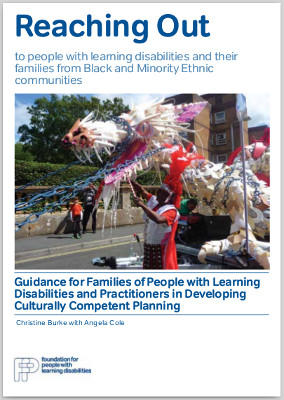 Tool 7: Culturally competent planning
Tool 7: Culturally competent planning
Reaching Out to people with learning disabilities and their families from Black and Minority Ethnic communities
Guidance for Families of People with Learning Disabilities and Practitioners in Developing Culturally Competent Planning
The Foundation for People with Learning Disabilities
This guide is written in response to the Reaching out to families project’s conclusion that practitioners need to demonstrate more cultural competence in planning.
![]() Download Culturally competent planning as a PDF file (525KB)
Download Culturally competent planning as a PDF file (525KB)
